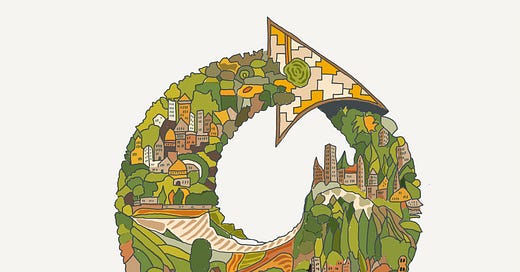I’m (slowly) finishing off the manuscript for the new Planetary Philosophy book, and thought I would share with you the introduction to the section on the Social Age. As I was reviewing the document with Sae, who is editing it for me, she said that this section should come earlier in the work, as it’s foundational to understanding the rest. I think that this is true for much of my work: where the concept of the Social Age provides the context and provocation.
“We are in the Social Age: whilst the trappings are those of our glittering technologies, the shift is sociological. Almost silently we have slipped into a new paradigm, and one that subverts legacy structures of nationhood, commerce, power, and identity.
Today we are radically connected, through multiple layers of redundant technology, maintaining ever larger numbers of both weak and strong social ties.
Knowledge is changing: away from the codified, owned, centralised and controlled and towards the dynamic, adaptive, contextualised, and co-created. Also: imperfect, invalid, partisan and fragile: to survive we require new focus on validation, metacognition, and collective action.
Through the rise of social and collaborative technologies, we see the rise of communities and belong to these in varied ways. We seek, shelter, participate, or hide within them. And within them we find power, contributing to an overall truth.
That power is rebalancing: away from the physically located notions of Organisation and State, and into increasingly socially contested domains. Also: from the system to the hyper connected individual.
So one person, with the right platform (both technological and social) can hold the global organisation to account.
Follower-ship is the new mineral rights. To be connected is to be powerful.
Look at our world again, from orbit: the patchwork of physical state, the electric web of state-person. Layer upon layer.
We mistake this for a digital age: maybe it is, if we are looking at proliferation, or quantifying interaction - the number of units shipped - but the experience is social. Technology changing what it means to be human.
Our most fundamental mechanisms of understanding our self, our surroundings, our systems, have evolved and, hence, our understanding and conception of reality itself must shift.
Technology is not a backdrop to our thought: it has changed the imagination that we inhabit. It changes how we think. We are rewired. And this change is accelerating.
Even if none of it is real: it is real enough in our imagined world, our circus of ideas, that it counts as ‘true’ (even as we lose connection with what ‘truth’ really is at all).”
Reading this again, I recognise that much of it is defined by absence - what is no longer true - and I think that makes sense. We know what we are leaving behind, but are not yet sure where we will land. And hence that is the nature of this work - and indeed all my work. To explore, sketch, research, and ultimately, to tell a story. But to recognise that it is not a complete story, nor a universal truth. To thrive in the context of the Social Age is to recognise that it is inherently a shifting, emerging, landscape.
Thank you for your support around my work.



